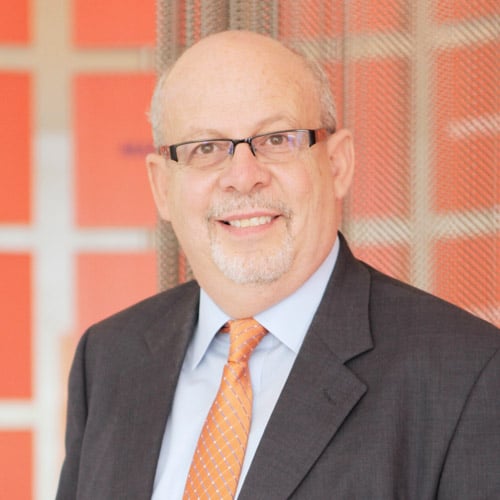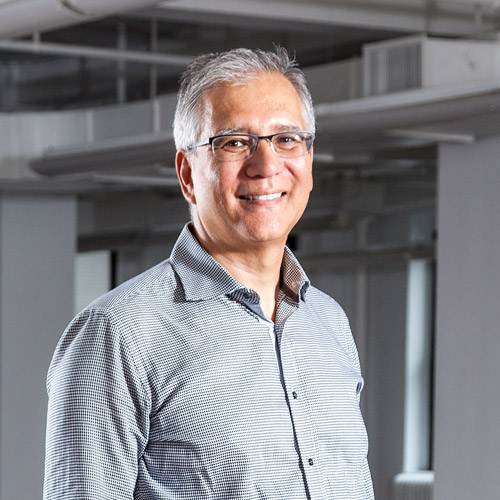Javier Rodriguez joined DaVita Kidney Care’s reimbursement department in 1998 and worked his way up to become CEO of the company. As one of only a few Hispanic CEOs in Fortune 500 companies and one of this year’s Top 10 Líderes, Rodriguez sits down with HE to reflect on the choices—and the belief system—that helped him rise to the top.
Hispanic Executive: When you were growing up, did you envision yourself being CEO of a major corporation someday?
Rodriguez: I don’t think so. I was like any other student, playing sports, navigating social challenges, trying to get a girlfriend… those types of things. What was different is that I went to a Jesuit high school where we had requirements around social work and getting involved in the community. My schooling taught me about giving to others and being cognizant of people other than yourself.
 Do you feel like there were people in your life at that time who saw your potential and encouraged it?
Do you feel like there were people in your life at that time who saw your potential and encouraged it?
Definitely. I was fortunate enough to have people that went out of their way to really take care of me. The head of the school was a priest named Father Zimmerman who was always caring and thoughtful. He understood students and what it was like to have a curious mind that had not fully matured. He was a mentor who helped me in my journey to navigate the complexities of life.
To what do you attribute your business and entrepreneurial sensibilities?
My father had several entrepreneurial ventures when I was growing up. When I was eight years old I started working in his business, a gift shop, during the holidays, wrapping gifts and assisting customers. Later, he opened up a restaurant and I worked as a dishwasher and a busboy. I later got promoted to the big leagues, to waiter [laughs]. All along I was taught a very intense work ethic and respect for how hard it is to make it.
Did you choose the health-care industry or did it choose you?
My goal was to be fulfilled in my work and for my work to be important and relevant. So I didn’t consciously pick health care at the start of my career, but I found it to be a perfect platform for engaging in work that really matters, so I was drawn to it. My only intention was for my work to matter.
In your mind, what is the top concern in the health-care industry right now?
There is a big push towards transparency in health care. As consumers, we need to know how to pick the right care. And there is a big movement to do better in the transitions of care—for example, going from one specialist to another and making sure that the necessary data goes along with that patient. Portability of information is an important theme. All together, the biggest concern is treating as much of the patient as possible by connecting the dots in the care continuum.
How is DaVita responding to that concern?
There are many ways that DaVita is working toward the most effective care. For example, we are doing a pilot project with Medicare’s Center for Innovation to create ESCOs (end-stage renal disease seamless care organizations). This means we are financially responsible for every episode of care for each patient, whether it’s in kidney care or not. Our job is to facilitate the right care at the right time and make sure that the care is coordinated, so that a patient is not hospitalized because a medical professional didn’t know he or she was taking a certain medicine or had an infection that wasn’t reported. It means that we’re doing routine checks to make sure that we catch any problems or complexities as early as possible. We’re really at the frontier of holistic care.
What’s your guiding philosophy as a CEO concerning your employees?
I think of my role as a fiduciary. I have to make sure people are getting what they need to succeed in their particular lines of responsibility and make sure that they expand their frontiers and continue to push themselves to be the best that they can be. It’s easy to look at Michael Jordan or any other super-athlete and think, why do they need a coach? Well, the coach pushes even the best player to be better yet by encouraging certain disciplines. I think being a CEO is similar.
How is that carried out on a practical level?
We believe in merging the personal and the professional, so we have a lot of programs that get people to reflect on their life’s journey and where they are heading and how they want to get there. When people talk about human resources it cracks me up; we call it people services. We view this approach to people as the best way to outperform. It sounds vanilla, but when you do it at scale, it is not vanilla.
What’s your greatest long-term goal for DaVita?
While we are a large company, we pride ourselves in feeling small. We want to be the largest small company in America. We tell our team that we want to be a community first and a company second. Of course we’re formed as a company—we’re not naive to that reality—but if you aspire to feel more like a community, you will be a great company to work for. Our philosophy is more than just language—it’s more of a lifestyle.
You’re involved in several community organizations in DaVita’s home base in Denver. How does that tie in with the company’s mission and philosophy?
I joined the board of Mi Casa, whose mission is to advance the economic success of Latino families. DaVita has given Mi Casa both financial and intellectual support. We’ve sent a team of DaVita executives to Mi Casa to help them think through some of the issues they’re facing. We’ve also had the entire senior team of Mi Casa come to our offices to engage with us in what we called the DaVita Way of Teams. Organization leaders came to learn about ways to develop a higher functioning team. It has been a very fulfilling partnership for me, personally, because Mi Casa has a comprehensive model to address poverty and achieve lasting economic stability for Latinos.
What words of advice do you have for Latino youth today?
The American dream is still alive. I am so grateful to be in this land of opportunity, and while people want to talk about how it’s changed, it’s been a total meritocracy for me, and I think it is totally alive. You are in charge of your destiny. Enjoy the journey, but be aware of how rich it is, and when it’s time to give back, do give back. There are always people along the way who need help. You may need a hand to pull you up, but remember to offer yours up whenever possible. So much of life is what you make of it.

